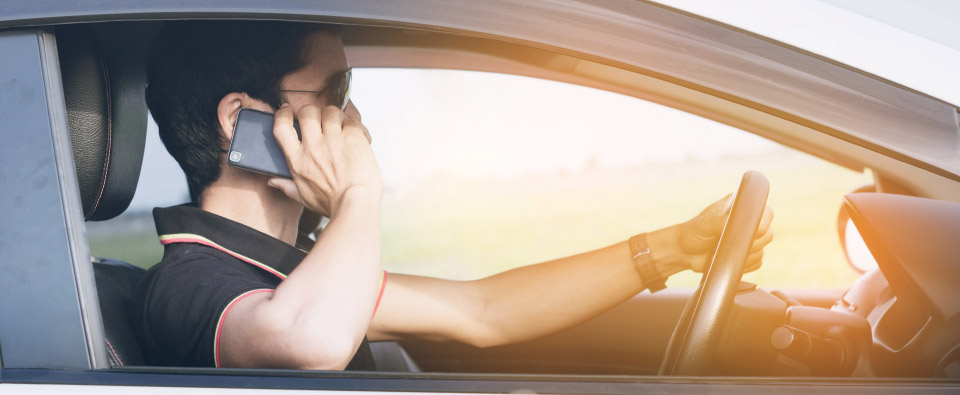Ask any seasoned driver and they will tell you how nervous they felt when they first passed their test and were told to hit the road. Sure, there’s a great sense of freedom but the flip side is the unpredictability of other drivers. We all need to feel, when we get behind the wheel, that other road users are aware of the responsibility that comes with being in control of a vehicle. We all need to feel safe on our roads.
The number of car drivers on Irish roads peaked at 1.9 million in 2015 and continues to rise. The number of vehicles, including tractors and motorcycles rose to over 2.5 million as of December 2015.
These figures show that our roads are becoming increasingly crowded - and that’s not counting visitors from Northern Ireland or Britain, including pleasure trippers at weekends and during the summer.

Speed kills
Speed is still the number one problem on Irish roads, with more than half a million drivers receiving penalty points for breaking the speed limit as of June 2017. Some 40% of fatal collisions are caused by excessive or inappropriate speed.
A pedestrian hit by a car at 30km/h has a 1-in-10 chance of being killed. This increases fivefold when the speed is 50 km/h, and ninefold when the speed is 60kmh. Clearly speed is a major factor in road safety, something all drivers should be aware of from the moment they get behind the wheel.
Reducing speed by 1km/h will dramatically reduce road accidents
According to the European Commission and work carried out by Nilsson in Sweden, ‘a change in average speed of 1 km/h will result in a change in accident numbers ranging between 2% for a 120 km/h road and 4% for a 50 km/h road.’ This result has been backed up by Scandinavian, Australian and Dutch road safety engineers.
The majority of Irish drivers are not in favour of a lenient approach to driving offences. A survey carried out by AXA found that 80% of drivers felt penalties for traffic offences should be more severe, compared with just 28% of drivers in France.

Mobile phones use while driving
According to the Road Safety Authority (RSA), making a call makes you four times more likely to crash. Texting: a staggering 23 times more likely.
As Irish road safety statistics stand in 2017, mobile phones feature heavily in penalty point convictions. As of 30 June 2017, more than 77,000 people were given penalty points for driving while holding a mobile phone. These statistics don’t provide a breakdown of what the driver was doing while holding the mobile phone. They may have been taking a call or texting, reading email or checking Facebook. So, if you’re reading this and have been guilty of such an offence, don’t be tempted to repeat it.
Improved international vehicle safety
The introduction of international vehicle safety standards is key to improving car safety on our roads. Vehicle safety addresses the safety of all road users and includes measures to help avoid a crash, to mitigate the severity of an accident before it occurs by slowing the vehicle using intelligent speed management or advanced braking, to reduce injury in the event of an accident and reduce the consequences of injury.
Given that pedestrians, cyclists and motorcyclists - who are the most vulnerable road users - make up 39% of the deaths on our roads, safer vehicles will help to definitively reduce road deaths in this group.

Impact of alcohol on road safety
The RSA has found that between 2008 to 2012, alcohol was a contributory factor in approximately 38% of all fatal road accidents. This figure was down slightly, at 30%, between 2013 and 2014.
1 in 10 collisions that involved alcohol occurred in the morning
Alcohol has been found to be a contributory factor in 30% of all motorcyclist deaths. Only 9% of pedestrian deaths involved a pedestrian who had consumed alcohol. Of 330 collisions studied, 1 in 10 of all drink-driving collisions occurred between 7am and 11am. This statistic reveals that driving the morning after having consumed alcohol is a major risk factor in road deaths.
Of all driver behaviour, drink-driving is the least socially acceptable and carries the highest risk for drivers, pedestrians and other vulnerable road users such as cyclists and motorcyclists.
As with mobile phone use, it’s something that drivers have the power to control and change. The impact of such a change on road safety could be dramatic. If, on the other hand, drink-driving continues to occur, road fatalities will undoubtedly increase.
The ripple effect of driver behaviour
Driver behaviour plays a key role in road safety and perceptions of road safety. A study commissioned by the London School of Economics (LSE) and the Goodyear tire company in 2105 found that a cooperative attitude is helpful when interacting with other drivers.
If we are considerate drivers, it will have a knock-on effect. Likewise, when we are inconsiderate on the road, this too has a ripple effect, resulting in others driving more selfishly than they might otherwise have done.
Some 88% of respondents to this driver behaviour survey admitted they felt that there were unwritten rules as to how they should behave towards other road users. Interpreting these ‘unwritten rules’ can be the source of conflict on our roads, leading to misunderstandings, road rage and accidents.
Empathy increases safety
Greater empathy for other road users can lead to more considerate and safer driving. The LSE and Goodyear study mentioned above found that survey participants were open to considering refresher driving courses if widely available.
The survey also showed increased levels of aggressive driving in cities. London, Rome, Prague and Paris measured higher for aggressive driving.
Drivers clearly have a key role to play in creating a safer environment by empathising with other road users.
Improve your own driving behaviour to improve road safety
Feeling safer on our roads begins with our own driving behaviour. Asking how we can improve our attitude to other drivers and road users, as well as avoiding distractions such as mobile phones, has been shown to dramatically increase our safety on the road. Research has consistently shown that more than 80% of road crashes resulting in injury or fatality are caused by driver error.
Speeding, drink-driving and not wearing a seatbelt are the main causes of death and injury on Irish roads. Driver distraction due to mobile phone use is another major factor in road accidents. Some 50 countries within the European region - or 96% - prohibit the use of hand-held mobile phones while driving, and four countries even prohibit the use of hands-free devices for mobile phones.
It is interesting to note that 49% of drivers believe that the numbers of fatal accidents on our roads can be reduced, compared with a figure of 45% in 2016.
Drivers, it seems, fail to recognise that their behaviour behind the wheel can have a major impact on road safety. If we want to feel safer on our roads, and make others feel safer too, we should belt up, slow down and take account of road conditions. Also, stay away from the mobile phone and never, ever drink and drive. Safe journey!


